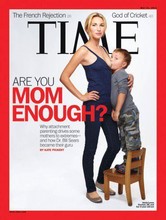Are You Mom Enough? (Did They Get You?)
 Did they get you? Did they suck you into reactivity and polarization?
Did they get you? Did they suck you into reactivity and polarization?
Can the Time Cover Make You A Better Parent?
That is their job — to get you to pick up and buy that magazine, to get you irritated enough that you just have to bring it up to your friends, and hopefully to generate enough heat to compel you to get online and comment and blog about it. (Well, I guess they got me!)
But that is their business: selling magazines. We don’t have to be pawns in that game. Sure, there is some benefit in starting these conversations so we can become a better educated public and have these debates out in the open. But when we get jerked into reactivity by the marketing geniuses, there are downsides that may outweigh any benefits — especially for our own lives and the lives of our children.
Is parenting your competitive sport?
When I saw that cover image (and half a dozen CNN debates about it in one day), I wondered to myself: “Did this woman just get steamrolled by the lure of being on the cover of Time magazine, did the editors and marketing team trick her into this pose, or is she really as prideful about her parenting choice as she seems?” The next thought: we are all subject to parenting pride.
Some of us — and I don’t know if this is true for you, so check it out for yourself — have turned our parenting into another thing to be successful at, another thing to excel in, and a new way to stand above the rest.
Instead of simply breastfeeding for as long as feels right for you and your child, a standard gets fixed in the mind and the judge orchestrates the disapproval when others choose “the lesser path.” In place of simply being with your children everyday for the first three years because that is what integrity feels like to you, a blue-ribbon pride bubbles up and turns the park bench parley into a discourse on the merits of your award-winning approach.
Yes, magazine covers are designed to yank us into reactive states of judgment and polarization, but ultimately the decision to dilapidate into comparison and pride is our own. Magazines don’t cause smugness: people do.
![Parenting pride is a source of suffering. image]() Parenting pride is a source of suffering.
Parenting pride is a source of suffering.
Smugness — a defensive and compensatory reaction
Did you ever see that South Park episode where Kyle’s dad gets a bad case of Prius-pride? He becomes so smug about his environmentalism that he up-and-moves his family to where of all place — San Francisco! (If you haven’t seen it, you should really check it out). Not only does he alienate half of the town with his Prius-pride and begin enjoying smelling his own farts with his new Bay Area friends, but he uproots his kids in order to boldly display his principles to the world and surround himself with self-congratulatory citizens. The “smug” factor becomes so severe that it creates a perfect storm and devastates the town of South Park.
Sometimes I listen to conversations (and must admit, sometimes the words were coming out of my own mouth!) and I hear real attitude and condescension being communicated about “those people” who just don’t get it. And I get it; it is frustrating when you feel like you have to swim against such a strong cultural tide that looks down on your own choices in parenting. Push-back is a natural reaction to feeling judged by a huge swath of the country. But sometimes, protecting ourselves turns into belittling, conceit, and arrogance on our side. In short, we get sucked into the game of pridefulness and put-downs.
But when we get too prideful about anything, we lose our humility. When we lose our humility we become cut off from our inherent value and the virtue of living our lives in the best way we know how. More energy begins going into proving ourselves right — and others wrong — and our kids begin absorbing our polarizing attitudes and posture of arrogance.
Our friends begin to edit themselves for fear of feeling judged, and our partners begin to doubt themselves sensing that they are being constantly assessed against the holy grail of perfect parenting. More and more energy goes into preserving your self-image rather than flexibly choosing what works in any given moment — for your kids and for your family as a whole. In the end, parenting pride can cut our loved ones off from what they need most: the modeling of openness, acceptance, and the living of life with both feet on the ground.
 Humility is not a state of low self-esteem; it is a source of integrity and compassionate action.
Humility is not a state of low self-esteem; it is a source of integrity and compassionate action.
Somehow our culture has turned the meaning of humility into a state of lowliness — when one’s status or importance is diminished in some way. They have given us two choices: be proud or be humble. But these are two poles of a single realm: the realm of the ego and it’s close companion the superego (judge).
How important am I? What is my status? Am I better or less than the others?
These are the self-focused questions that naturally emerge from the part of us that never quite feels like enough; the part of us that constantly has to prove ourselves to others (and to ourselves). Understandable — these are the cards we are dealt. But when you lose contact with your inherent value and the fact that you are exactly what your child needs, you can begin to hide behind smugness and disdain of those who make different choices than your own.
![Humility nourishes our kids more than judgmental pride. image]() Humility nourishes our kids more than judgmental pride.
Humility nourishes our kids more than judgmental pride.
“If you judge people, you have no time to love them.” — Mother Teresa
If your hope is that your child will not wrestle as intensely with these issues of self-esteem and defensiveness, it will serve them if you are able to drop below this cloudy layer of judgments and into the natural confidence of your Being.
Humility used to mean “to be returned to the ground of your Being.” When you are dropped into your Beingness, the ego no longer controls your actions and reactions. You are calm, collected, aware, kind, gentle, and are concerned with the quality of daily living more than any trophy for doing it right. Humility carries a strong, yet quiet confidence in it. When humble we somehow know that everyone is on their own path, that we are each doing the best we can, and that we all need support and encouragement rather than admonishments and criticisms
Take Home: Try not to allow competition and pridefulness invade your parenting. Humility does not ask, “Are you mom enough?” It instead asks, “How can I be of service today?”; to my child, my family, and to the wider community of parents trying to find their way.
Try: Observe yourself this week and see if you can catch your ego and judge in the act. Simply notice when you begin thinking judgmental thoughts about that dad who is always on the cell phone, that mom who is deciding to wean her 18 month-old, or those “poor, misguided families who choose to send their kids to school.”
When you become aware of a judgment, don’t add fuel to the fire and begin judging yourself: this is simply what the judge and the comparative mind do. There really is no stopping it. Simply notice and consciously choose not to go along blindly with the judging and pridefulness. That act alone will move you in the direction of humility and take some of the frustration and fight out of life, and then you will be back on track focusing on what really matters anyway — being the best mom or dad you can be. No trophy or magazine cover ever comes close to that.



